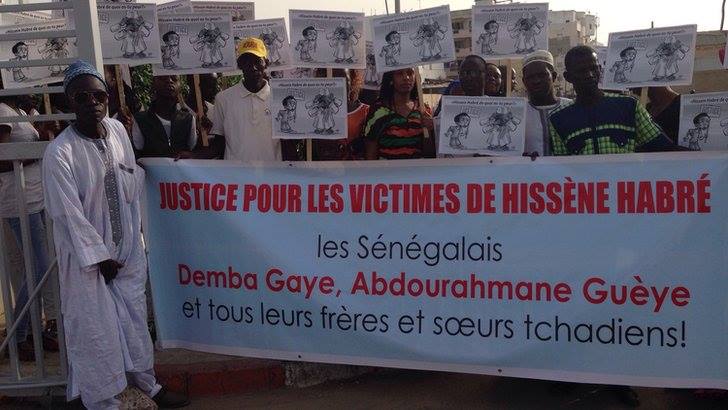
Complaint against Chad: 7,000 victims of Habré regime turn to African Commission in their struggle for reparation
N’Djamena | The Hague | London – Today, 7,000 victims of the Hissein Habré regime filed a human rights complaint against the Government of Chad before the African Commission on Human and Peoples’ Rights, Africa’s premier human rights institution.
The complaint – Clement Abaïfouta and 6,999 others v The Republic of Chad – accuses Chad of failing to comply with a judgment of the Special Criminal Court of N’Djamena of 25 March 2015. In a landmark trial, the Court convicted then twenty security agents for their involvement in murder, torture, barbarism and other human rights violations committed during the Habré regime. It awarded approximately $125million USD in compensation to 7,000 victims who participated in the proceedings as civil parties. Finding that Chad was responsible for the acts of the security agents, it ordered the convicted perpetrators and the government to each pay 50% of the award of compensation. It ordered for a Commission to be established to oversee the implementation of its judgment, chaired by the Prime Minister.
Almost three years later, the Government of Chad has failed to comply with the Court’s judgment, preventing victims who have waited for decades, from receiving reparation for the crimes committed against them during the Habré regime from 1982 to 1990. The Government has yet to establish the Court ordered Commission on implementation.
The victims are represented by their lawyers, Jacqueline Moudeina, Lambi Soulgan and Kemneloun Djirabé, and assisted by the Association Tchadienne pour la Promotion et la Défense des Droits de l’Homme (ATPDH), The Redress Trust (REDRESS), Human Rights Watch and Freshfields Bruckhaus Deringer LLP.
“The prosecution and conviction of security agents responsible for torturing us gave us great hope that the current government will break the cycle of impunity and ensure that we obtain justice. This has not happened. We cannot wait any longer. Many victims of the Habré regime have died without ever receiving any reparation,” said Clément Abaïfouta.
Abaïfouta is the lead applicant in the case and President of the Association des Victimes de Crimes du Régime de Hissène Habré. As a political prisoner under the Habré regime from 1989 -1990, Mr Abaïfouta was subjected to torture and forced to burry many of his co-detainees who had died during detention.
“For more than two years, we have tried to engage the Government to ensure that victims receive the reparation awarded by the Court, but without success. We file this complaint with the African Commission to remind Chad of its obligations and its responsibility towards the victims, and we call on the Commission to refer this case to the African Court on Human and Peoples’ Rights in light of the seriousness of the case,” said Jacqueline Moudeïna, president of the ATPDH.
Moudeïna is the lawyer who has represented Habré’s victims before the Special Criminal Court in N’Djamena and who has supported victims’ efforts to obtain justice since the late 1990s.
“The Special Criminal Court in N’Djamena was very clear that Chad is responsible for the acts its agents committed under the regime of Hissein Habré and the government cannot escape this responsibility by continuously delaying compliance with the Court’s decision. We hope the African Commission and African Court will act promptly and assist victims to obtain their long overdue reparation,” said Juergen Schurr of REDRESS.
REDRESS is one of the non-governmental organisations supporting the lawyers in filing the case before the African Commission.
“This case has seen many turns and twists, and it is only thanks to victims’ tireless campaign for justice that we have had some form of accountability, including by the courts in Chad as well as the prosecution and conviction of Habré himself before the Extraordinary African Chambers,” said Reed Brody, Counsel for Human Rights Watch.
Brody has worked with Habré’s victims since 1999. The Extraordinary African Chamber – which convicted Habré to life imprisonment in April 2017- had also ordered compensation of victims, which has yet to provided to victims. “It is important that justice does not stop here, but that victims receive the reparation to which they are entitled.”
For more information please contact:
Jacqueline Moudeïna, Victims’ Lawyer, (French) on +23566270992
Eva Sanchis, Head of Communication, REDRESS, (Spanish, English) on +44 (0)2077931777 (office) or +44 (0) 7857110076 (mobile).
Reed Brody, Counsel, Human Rights Watch (French, English) on +1 917 3886745.
Notes to editors
A copy of the complaint is available here in English and here in French.
A 1992 Chadian Commission of Inquiry accused Hissein Habré’s government of systematic torture and estimated that 40,000 people died during his rule (1982-1990) in Chad. Habré’s dictatorship was marked by widespread atrocities, including systematic torture, widespread political killings, thousands of arbitrary arrests, sexual slavery and the targeting of the civilian population, including specific ethnic groups. To this day many families still do not know where their loved ones were buried and survivors are still living with permanent physical and psychological reminders of their ordeal. It is estimated that Habré’s brutal regime left 80,000 orphans, more than 30,000 widows and more than 200,000 people without moral or material support.
Victims filed a complaint in Chad on 25 October 2000 against security agents for torture, murder and disappearances. While the process was continuously delayed, more and more victims joined the proceedings until 7,000 victims constituted themselves as civil parties before the Special Criminal Court of N’Djamena. The Court delivered its verdict on 25 March 2015.
The African Commission on Human and Peoples’ Rights is the principle human rights body in Africa, supervising States’ compliance with their obligations under the African Charter on Human and Peoples’ Rights. In cases revealing “serious and massive” human rights violations, the Commission may refer a case to the African Court on Human and Peoples’ Rights, the continent’s highest human rights court. The Court’s judgments are binding.
